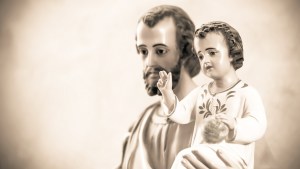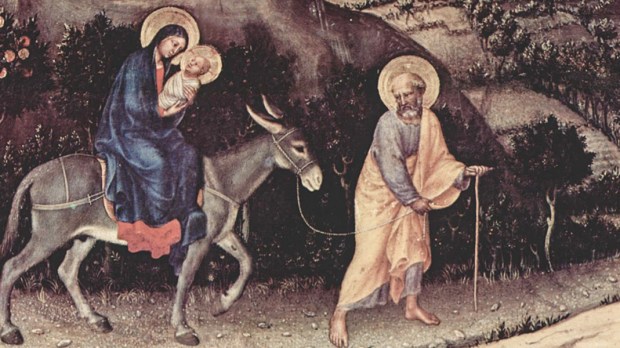Three times a day, the Church invites the faithful to pray the Angelus, which records Mary’s “fiat” — her expression of acceptance of God’s will as announced by the Angel. Mary said to Gabriel, “Let it be done unto me according to thy word.” The Latin is “Fiat mihi secundum verbum tuum” — the “fiat,” the let it be done, is a summary of the phrase, and of Mary’s whole life.
But, Pope Francis pauses in his new apostolic letter on St. Joseph to consider another fiat — that of St. Joseph, and why his fiat is such an example for us in our daily lives, perhaps particularly in our times.
“Joseph,” says the pope, “accepted Mary unconditionally. He trusted in the angel’s words.”
He made his following of the law dependent on charity, and, Francis observes, “Today, in our world where psychological, verbal and physical violence towards women is so evident, Joseph appears as the figure of a respectful and sensitive man.”
Even without the big picture
But Joseph makes his decision “even though he does not understand the bigger picture,” and God “helped him by enlightening his judgment.”
The pope observes:
Often in life, things happen whose meaning we do not understand. Our first reaction is frequently one of disappointment and rebellion. Joseph set aside his own ideas in order to accept the course of events and, mysterious as they seemed, to embrace them, take responsibility for them and make them part of his own history. Unless we are reconciled with our own history, we will be unable to take a single step forward, for we will always remain hostage to our expectations and the disappointments that follow.
Thus, says Pope Francis, St. Joseph traces a spiritual path for us, but not one that “explains,” rather that “accepts.”

Read more:
Pope Francis declares a Year of St. Joseph starting today
Not passive
In this acceptance, the pope continues, Joseph is not passively resigned, “but courageously and firmly proactive.”
In our own lives, acceptance and welcome can be an expression of the Holy Spirit’s gift of fortitude. Only the Lord can give us the strength needed to accept life as it is, with all its contradictions, frustrations and disappointments.
Jesus’ appearance — this gift from the Father — is what enables us “to be reconciled to the flesh of our own history, even when we fail to understand it completely,” says the pope.
Just as God told Joseph: “Son of David, do not be afraid!” (Mt 1:20), so he seems to tell us: “Do not be afraid!” We need to set aside all anger and disappointment, and to embrace the way things are, even when they do not turn out as we wish. Not with mere resignation but with hope and courage. In this way, we become open to a deeper meaning. Our lives can be miraculously reborn if we find the courage to live them in accordance with the Gospel. It does not matter if everything seems to have gone wrong or some things can no longer be fixed. God can make flowers spring up from stony ground. Even if our heart condemns us, “God is greater than our hearts, and he knows everything” (1Jn 3:20).
Facing what’s real
The pope said that this is an example of what he calls “Christian realism, which rejects nothing that exists.”
Reality, in its mysterious and irreducible complexity, is the bearer of existential meaning, with all its lights and shadows. Thus, the Apostle Paul can say: “We know that all things work together for good, for those who love God” (Rom 8:28). To which Saint Augustine adds, “even that which is called evil (etiam illud quod malum dicitur).” In this greater perspective, faith gives meaning to every event, however happy or sad.

Read more:
Regretting something? Padre Pio tells you how and why to take heart
Nothing facile
The pope warned that we should not think of believing as “finding facile and comforting solutions. The faith Christ taught us is what we see in Saint Joseph. He did not look for shortcuts, but confronted reality with open eyes and accepted personal responsibility for it.”
Joseph’s attitude encourages us to accept and welcome others as they are, without exception, and to show special concern for the weak, for God chooses what is weak (cf. 1 Cor 1:27). He is the “Father of orphans and protector of widows” (Ps 68:6), who commands us to love the stranger in our midst.[20] I like to think that it was from Saint Joseph that Jesus drew inspiration for the parable of the prodigal son and the merciful father (cf. Lk 15:11-32).

